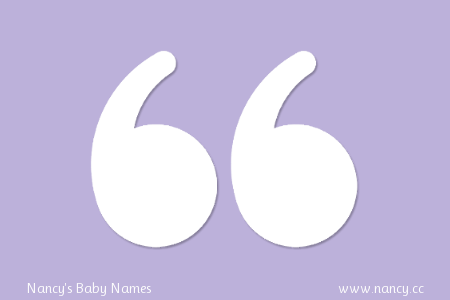April is here, so it’s time for another batch of name quotes!
From an article about the first spoken dialogue system used in space:
Since Clarissa’s developers planned to set her up on the International Space Station (ISS), the team “went looking for names that had ‘ISS’ in them,” said [John] Dowding. “There aren’t many of those. Clarissa won out,” [Manny] Rayner told Space.com, adding that the team thought a woman’s name would make the system sound friendly.
(The system was first used aboard the ISS in 2005 — about a decade after Clarissa Explains it All was on the air.)
From an Instagram post by Irish television presenter Lisa Cannon:
I always feel oddly yet loosely connected to [the late Lisa Marie Presley] as I was an only child too and was named after her… Lisa Sara Marie Cannon – Lisa Marie because my father like the rest of the world was an Elvis fan and my middle name Sara after Bob Dylan’s Wife. My father at the time was a budding Rock Journalist for Hot Press Magazine & the NME in London so music of all genres was always playing in our home. When people ask you the origin of your name or who your named after it was always “Elvis’ daughter & Bob Dylan’s Wife” which always got a smile.
From a recent article about YouTube influencers The Newbys:
Tiny traveller Crusoe Newby is less than two years old — but has already tottered his way around 24 different countries.
[…]
Named after fictional castaway Robinson Crusoe, the hero of the 18th century novel by Daniel Defoe, he had travelled to 11 countries while still in the womb. But his official tally of 24 have all been racked up since his birth. His adventure started when Tara and John decided to sell their Bristol home and convert a £3,000 van to travel the globe in May 2020.
[…]
“Robinson Crusoe is John’s favourite book of all time because it inspired him as a young boy to think of a life of adventure.”
From the 2020 obituary of Dana Marie Ek in Fauquier Now:
Dana was born on October 19, 1995, in Astoria, Oregon. She was named after the Dana Glacier — located deep in the wilds of the Glacier Peak Wilderness Area, because her father thought it was the most beautiful place on heaven or earth.
From a 2007 article called “You Are What Your Name Says You Are” in the New York Times:
Sociologists like Mr. Besnard observed that first names [in France] were often quick markers of social and educational status. As another Libération reader, an elementary school teacher, pointed out: “I can often guess the ‘profile’ of a child thanks to the first name. A ‘Maxime,’ a ‘Louise,’ a ‘Kevin,’ a ‘Lolita.’ It’s sad, but that’s how it often works.” That is, Maxime and Louise probably have wealthy parents, while Kevin and Lolita are more likely to have a working- or lower-middle-class background.
Indeed, bourgeois French parents are unlikely to give their children “Anglo-Saxon” names; Jennifer was the most popular name for girls from 1984 to 1986, but it’s a safe bet few Jennifers came from well-educated families. (The craze is commonly explained by the success of the TV series “Hart to Hart” in France at that time — Jennifer Hart was one of the title characters — while “Beverly Hills, 90210,” featuring a popular character named Dylan McKay, is sometimes blamed for the explosion of Dylans a few years later.)
For more quotes about names, check out the name quotes category.
